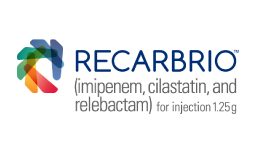Dosing and administration for RECARBRIO™ (imipenem, cilastatin, and relebactam)
Learn about:
Dosing and administration for RECARBRIO
Dosing of RECARBRIO 1.25 g (imipenem 500 mg, cilastatin 500 mg, and relebactam 250 mg) for adult patients with HABP/VABP, cUTI, or cIAI
500 mg imipenem, 500 mg cilastatin, 250 mg relebactam
30 min IV
Q6H
Dosage of RECARBRIO by indication in adult patients with CLcr ≥ 90 mL/mina
aCLcr calculated using the Cockcroft-Gault formula.
The recommended duration of treatment is 4 days to 14 days. The severity and location of infection, as well as clinical response, should guide the duration of therapy.
Patients with renal impairment
Patients who have CLcr less than 90 mL/min require dosage reduction of RECARBRIO, as shown below. For patients with fluctuating renal function, CLcr should be monitored.
Dosage of RECARBRIO for adult patients with renal impairment
aCLcr calculated using the Cockcroft-Gault formula.
bAdminister intravenously over 30 minutes.
cAdministration should be timed to follow hemodialysis.
RECARBRIO is provided as a single vial in a fixed-dose combination; the dose for each component will be adjusted equally during preparation.
Patients with CLcr less than 15 mL/min should not receive RECARBRIO unless hemodialysis is instituted within 48 hours. For patients maintained on hemodialysis, administer RECARBRIO after hemodialysis and at intervals timed from the end of that hemodialysis session. There is inadequate information to recommend usage of RECARBRIO for patients undergoing peritoneal dialysis.
cIAI, complicated intra-abdominal infections; CLcr, creatinine clearance; cUTI, complicated urinary tract infections; HABP/VABP, hospital-acquired bacterial pneumonia and ventilator-associated bacterial pneumonia; Q6H, every 6 hours.
Dosing resources


Dosing and billing guide
Dosing information as well as preparation, compatibility, and billing of the product.
